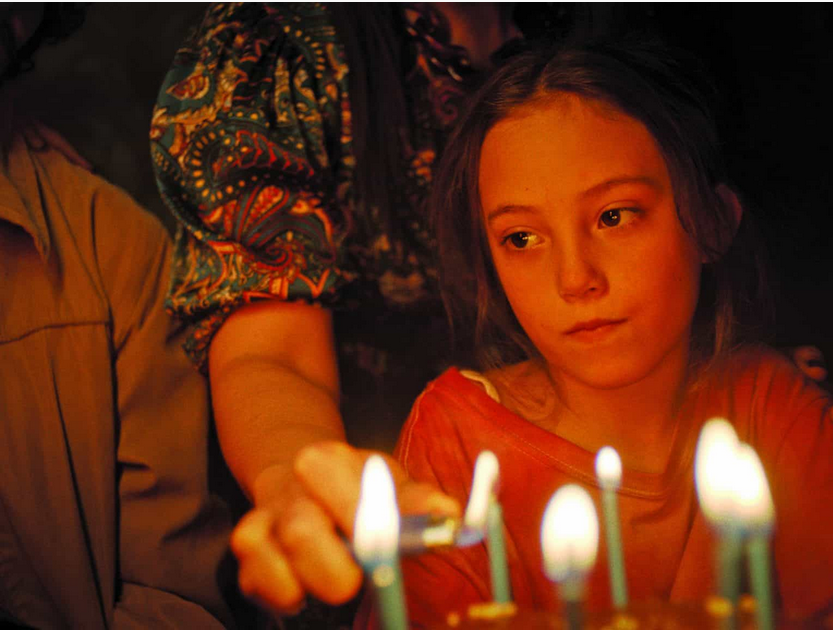Naíma Sentíes in Lila Avilés’ Tótem
Review by Rebecca M. Alvin
Many years ago, my first documentary premiered at a film festival in Chicago called the Women in the Director’s Chair Film Festival. It was an incredible experience I will never forget and the kind of screening many women directors in that time period sought out as there was a whole circuit of women’s film festival. And there still are some, but many have faded away, making it especially difficult for early career female filmmakers to get that kind of support. At the same time, things are changing and women directors now have greater access to all kinds of film festivals and screening opportunities that were closed to us, unofficially of course, at the turn of the 21st century. So it is always great to see the Provincetown Film Society’s mini festival during Women’s Week, where we get to see films by and about women from around the world, and with all sorts of perspectives.
This year I took a special interest in two films that feature little girls as their protagonists, King Coal directed by American filmmaker Elaine McMillion Sheldon and Tótem directed by Mexican filmmaker Lila Avilés. Both films utilize non-actors in their casts and explore their worlds through the eyes of children, but with different cinematic strategies.
King Coal is an exquisitely shot portrait of Appalachia. Shot primarily in the filmmaker’s home state of West Virginia, the breathtaking mountain vistas are the backdrop to a story about the overwhelming significance of the coal industry in the lives of those who live in the small towns of this region.With a background in documentary, Sheldon wanted to make a film that included elements of observational documentary but which also incorporated other methods of truth-telling, through artistic interpretations, poetry, and technically fictional characters. The poetic narration, beautiful as it is, sometimes compromised the cinematic nature of the film. For example, early in the film the images are so evocative and real and powerful that an audience did not need the voice over narration to clutter up their experience. But at other times, the narration brings in metaphor and memory and insights that we might not otherwise grasp. In this film, the children observe the world around them and just behave as they naturally would, inviting us to reflect on the impact of our own environments in childhood.
In Avilés’ film, Tótem, we experience familial relationships, death and dying, and the ways in which different people cope with their struggles through the eyes of seven-year-old Sol who has come to her grandfather’s house for a birthday party for her dying father. As the many guest in the Mexican family show up for the fiesta, Sol peaks around corners, wanders in and out of rooms, and observes everyone adopting their roles within this particular family’s dynamics. The improvisatory feel, casual dialogue, and small moments make this a beautiful film that is also painful at times. But there is never any indulgence in melodrama and every character in the film is human and real and doing their very best, despite their flaws. It’s a warm film about a family struggling with impending loss in a very traditional Mexican manner, with a fiesta. As Mexican writer Octavio Paz put it in his landmark examination of his cultural heritage, The Labyrinth of Solitude, “It is significant that a country as sorrowful as ours should have so many and such joyous fiestas. They’re frequency, their brilliance and excitement, the enthusiasm with which we take part, all suggest that without them we would explode. They free us, if only momentarily, from the thwarted impulses, the inflammable desires that we carry within us.”
These two exceptional examples of cinematic storytelling about ordinary lives are testament to the great power cinema still has to offer up perspectives not widely considered and to elicit a connection between people of vastly different circumstances and backgrounds and awaken us to our common humanity while also exposing us to new information and ideas about ways of life other than our own or places far from Cape Cod. The Women’s Week film screenings offer many opportunities to see different worlds.

King Coal is screening Saturday, October 14, 4:30 p.m. and Tótem is screening Thursday, October 12, 4:30 p.m. and Saturday, October 14, 7:30 p.m. at Waters Edge Cinema, 237 Commercial St., 2nd Fl. For more information, full schedule of films, and tickets, visit provincetownfilm.org/cinema/womens-week.











